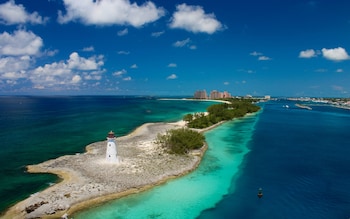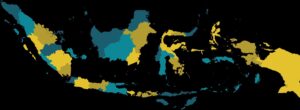The best countries in the world to be a digital nomad
10 min readMany of us have fantasised about living in our favourite holiday destination, swapping a dull commute for a walk along the beach, or the confines of the office for a poolside villa. Until the pandemic, moving abroad would have required a complicated visa process and, most probably, a change in career. But this is no longer the case.
Post-pandemic, many European countries – and some farther abroad – have introduced digital nomad schemes, allowing would-be emigrés a taste of living overseas without having to change occupation.
It is worth noting that while some countries do not officially have digital nomad schemes, other visas may provide a similar stay of residency. In Germany, for example, the Aufenthaltserlaubnis zur Selbstständige Tätigkeit allows freelancers to live in the country for up to three years.
Here, we explore some of the most attractive digital nomad visa schemes.
What is a digital nomad visa?
A digital nomad visa is one that allows people to live in a country for a limited amount of time while they work remotely. Digital nomads almost always need to be employed outside of the country they move to and prove a certain amount of funds in order to be eligible, plus pay a (sometimes substantial) application fee.
Almost all require applicants to prove they have the “technological means” to support remote work – that usually means having a laptop and access to a high-speed internet connection.
Most digital nomad visas span between one and five years, and some allow conversion to a more permanent type of residency after expiration.
For those who work from home, it can be an alluring prospect, with countries such as Italy, Spain and Greece all offering schemes. But it is worth noting that – among all the usual concerns with moving abroad – taxation can be particularly confusing for digital nomads, and all schemes differ.
Experts advise potential applicants to consult a tax expert before taking the plunge. Some states have agreements that mean digital nomads pay tax only in their own country. Others, such as Estonia, require nomads to pay tax in both countries after a certain amount of time.
Regardless of this complication, the visas – and the associated lifestyle – can be extremely attractive.
Which countries have digital nomad visa schemes?
Skip ahead to digital nomad visa requirements in:
Spain
Length
One year, with the option to renew for up to five years
Minimum income
£1,840 per month
Application fee
£62.55
Cost of living
One-bedroom apartment outside of city centre (monthly): £600
Basic utilities (monthly): £110
Pint of beer: £2.40
Cappuccino: £1.55
Spain’s digital nomad visa allows non-EU citizens to work remotely in the country for up to five years. Written permission is needed from an employer, though freelancers are accepted, too. Applicants must prove “specific expertise” in their field, demonstrated via a university degree, professional certificate or three years of work experience.
They must also have been in their current position for at least three months; freelancers can show long-term contracts as evidence of their stability. Up to 20 per cent of an applicant’s work can come from Spanish clients (but no more).

Applicants applying for a visa in Spain must prove ‘specific expertise’ in their field
Credit: Getty
Applicants must prove that they have a minimum income of £1,840 per month to apply, though a higher salary is needed if they support a partner or children. They must not have lived in Spain for the last five years.
Think Spain could be for you? Read our guides to the country here. If you just fancy a holiday, take a look at our guide to the best hotels in Spain instead.
How to apply: Full application details can be found on Spain’s government website. Applicants should expect to attend an in-person interview at their nearest embassy.
Italy
Length
One year, with the option to renew
Minimum income
£24,000 per year
Application fee
£99
Cost of living
One-bedroom apartment outside of city centre (monthly): £490
Basic utilities (monthly): £170
Pint of beer: £4.20
Cappuccino: £1.35
Since April 4, “highly skilled workers” have been able to move to Italy. Digital nomads are particularly encouraged to move to the remote – and very beautiful – villages in the south of the country, which are struggling with dwindling local populations.
Those hoping to apply must be a citizen of a non-EU state, be employed (or self-employed) in a way that allows them to work remotely, and earn at least three times the minimum level required for exemption from participation in healthcare costs. That’s currently around €28,000, or £24,000. They also cannot have been convicted of a crime within the last five years.

Italy is one of the newest European countries to introduce a remote working visa
Credit: Getty
Applicants need to prove they have health insurance valid for the entire length of their stay, plus prove “suitable accommodation” is booked, too. They also need to show that they have been a digital nomad, or remote worker, elsewhere for at least six months previously.
Keen for more? Our Italy guides include where to stay in the Italian Lakes and the perfect holiday in Tuscany.
How to apply: Applicants need to attend an in-person meeting at a “valid diplomatic consular office” and submit a declaration signed by their employer. Find out more on Italy’s Interior Ministry website.
Greece
Length
One year, with the option to renew
Minimum income
£3,000 per month
Application fee
£64
Cost of living
One-bedroom apartment outside of city centre (monthly): £340
Basic utilities (monthly): £180
Pint of beer: £3.80
Cappuccino: £2.80
Non-EU citizens have been able to apply for digital nomad visas since 2021. Applicants must have proof of health insurance, accommodation details, a clean criminal background and proof that they are able to work remotely.

Digital nomads in Greece must earn at least £3,000 per month
Credit: Getty
Those hoping for a breezy Aegean lifestyle should note, however, that a minimum salary of at least €3,500 (£3,000) per month is required, unless you’re bringing a spouse – in which case the minimum salary rises to €4,200 (£3,580). Bring an additional dependant and that number increases to €4,830 (£4,120).
Planning a Hellenic odyssey? Whether it’s for a year or just a fortnight, read our guide to the perfect Greek island-hopping holiday.
How to apply: Applicants must apply, in person, at the nearest Greek embassy. The application form can be downloaded from the Greek Ministry of Foreign Affairs website.
Estonia
Length
One year
Minimum income
£3,840 per month
Application fee
£51
Cost of living
One bedroom apartment outside of city centre (monthly): £375
Basic utilities (monthly): £226
Pint of beer: £4.25
Cappuccino: £2.85
Estonia launched its digital nomad visa early in the pandemic. The scheme has continued, allowing people with certain employment conditions to be based in the country for up to a year. Those conditions include having a contract with a company registered outside of Estonia, conducting business through your own company registered abroad, or working as a freelancer for clients mostly outside of Estonia.
Estonia also has an e-residency scheme, which gives successful applicants a “government-issued digital identity”, providing access to “Estonia’s transparent business environment”. Essentially allowing anyone to run an EU-based business, the scheme allows people to open an Estonian bank account, benefit from low rates of business tax and access start-up support.
How to apply: Applicants must apply, in person, at the nearest Estonian embassy. The application form can be downloaded from the Ministry of Foreign Affairs website.
Portugal
Length
One year, with the option to extend to up to five years
Minimum income
£2,800 a month
Application fee
£64
Cost of living
One-bedroom apartment outside of city centre (monthly): £620
Basic utilities (monthly): £95
Pint of beer: £2.15
Cappuccino: £1.50
Portugal has five types of digital nomad visa. Most will be interested in the Temporary Stay Visa, which allows those with proof of a remote job the opportunity to live in Portugal.
Their remote work must generate at least €3,280 (£2,800) a month – or 50 per cent more if entering with a spouse, and 30 per cent more on top of that if also bringing a child. As with most digital nomad visas, applicants need full health insurance, proof of accommodation and a clean criminal record.

Portugal is particularly popular with digital nomads
Credit: Getty
The Portuguese digital nomad visa lasts one year, though it can be extended four times to a maximum of five years. There are beneficial tax implications, too: for the first four years, nomads are subject to a 15 per cent tax rate, as opposed to the standard 25 per cent. The only catch? Nomads should be aware of the minimum stay requirement, which means they must spend 183 days within the country at some point during the first two years.
If you’re interested in something more permanent, the D2 Visa and the Golden Visa are targeted at those looking to move to the country in the long term. These require a substantial asset transfer into the Portuguese economy.
Those who wish to stay for less than 90 days (and who don’t require a Portuguese bank account) are able to use a short-stay tourist visa.
For the perfect trip to the Algarve, or a sight-filled city break to Lisbon, read our Portugal guides here.
How to apply: Applicants must apply, in person, at the nearest Portuguese embassy. More information can be found on the Portuguese Ministry of Foreign Affairs website.
Indonesia
Length
60 days, with the option to increase to six months
Minimum income
No minimum, but £1,600 in savings
Application fee
£160
Cost of living
One-bedroom apartment outside of city centre (monthly): £130
Basic utilities (monthly): £53
Pint of beer: £2
Cappuccino: £1.60
Despite its reputation as a digital nomad hot spot, Indonesia’s current visa scheme allows people to stay for up to only six months while working remotely. It was first introduced to encourage a more sustainable travel model, encouraging people to stay within the country for longer than the typical backpacking trip.
The B211A Business Visa requires applicants to have a job outside of Indonesia, with a minimum of $2,000 (£1,600) in savings. It’s possible you will also be asked for proof of a clear criminal record.
How to apply: More details can be found on the Indonesian government website.
United Arab Emirates
Length
One year, with the option to renew
Minimum income
£2,400 per month
Application fee
£490
Cost of living
One-bedroom apartment outside of city centre (monthly): £940
Basic utilities (monthly): £140
Pint of beer: £8.70
Cappuccino: £4.30
The UAE launched its Remote Work Visa in 2021 for digital nomads hoping to work from Dubai or Abu Dhabi. It lasts up to a year (with the chance to renew indefinitely) and applicants must have a monthly salary of $3,000 or £2,400, plus produce the previous month’s payslip and three months of bank statements. They must also have been working for their current employer for at least three years prior.
This is slightly different for business owners, who must have an average monthly income of $5,000 (£4,010), plus show proof of ownership for at least a year.
Be warned: while digital nomads can leave the country, an absence from the UAE for more than six consecutive months will result in an automatic visa nullification.
Planning a supersized trip to the City of Gold? Read on for our ultimate guide to a weekend in Dubai.
How to apply: Applications are processed online – visit the General Directorate of Residency and Foreigners Affairs portal for more information.
Costa Rica
Length
One year, with the option to renew for two
Minimum income
£2,400 per month
Application fee
£80
Cost of living
One-bedroom apartment outside of city centre (monthly): £375
Basic utilities (monthly): £70
Pint of beer: £2.40
Cappuccino: £2.80
Costa Rica is a highly desirable holiday destination – and those who are truly enamoured can now work from there for two years. To live in the country, the applicant needs to prove a minimum salary of $3,000 (£2,400) per month – and this must be steady.

Costa Rica’s digital nomad scheme is highly sought after
Credit: Getty
A claim of a salary of £4,000 per month cannot be accrued by earning £3,000 one month, then £5,000 the next, meaning that freelancers are advised to form a limited company from which to pay a salary. Digital nomads are exempt from tax on their foreign income while resident.
Applicants are also required to show proof of medical insurance, with a minimum coverage value of $50,000 (£40,100).
How to apply: Applications can be made digitally on the Costa Rican government website. The process is finalised once in the country – applicants must register their biometric data at an immigration centre within the first three months of living there.
The Bahamas
Length
One year
Minimum income
No minimum income (but proof of financial self-sufficiency needed)
Application fee
£823
Cost of living
One-bedroom apartment outside of city centre (monthly): £885
Basic utilities (monthly): £229
Pint of beer: £3.20
Cappuccino: £4.20
With the Bahamas Extended Access Travel Stay, or Beats, digital nomads can work from the Atlantic country for up to a year. With no minimum income (just the ability to support oneself financially), the scheme is proving particularly popular. Furthermore, remote workers are not required to pay additional income or capital gains taxes while in the country, meaning the laid-back island nation can be an affordable place to live.

Digital nomads can work from the Bahamas for up to a year
Credit: Getty
As with most schemes, applicants are required to have a clean criminal record and provide proof of employment or freelance contracts. They can also be a student enrolled in an overseas university, providing their college allows remote work.
Beach lovers should read our Bahamas-based content before considering the move, or find out more about the greatest islands in the Caribbean.
How to apply: Applications can be made via the Beats website.
Cost-of-living data provided by Numbeo.



